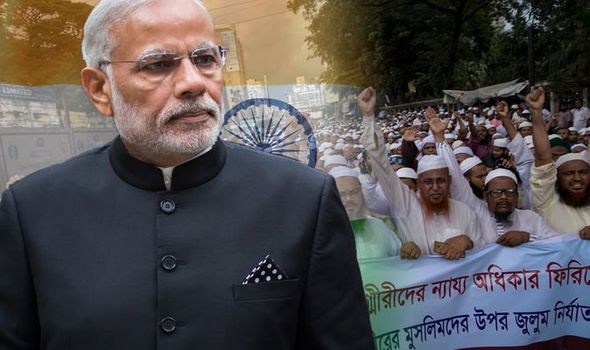
While the western media is largely ignoring this story, a major historical event has unfolded in Kashmir this week. The following briefer explains what is going on in this extremely unstable situation. Click on the links included below to gain more background information on the troubles and what is happening in Kashmir.

When the nations of India and Pakistan gained their independence in 1947 each state was supposed to serve as a solution to the greatest threat that independence posed for the subcontinent. Millions of Muslims and Hindus occupied these lands. The Muslims presumably did not want to live under the rule of Hindus. The Hindus presumably did not want to live under the rule of Muslims. To that end, Pakistan was to be the independent nation for the Muslims and India was to be the independent nation for the Hindus.
The result was the Great Partition of 1947. This immediate and forced migration of Muslims and Hindus across the subcontinent resulted in over 1 million deaths and 15 million displaced people. This was the origin story of India and Pakistan’s independence.
Out of this quagmire came the state of Kashmir.
Additional Reading:
Kashmir was a Muslim majority state on the subcontinent that was ruled by a Hindu. After independence, the state became caught up in political games between the leaders of India and Pakistan until it was eventually trapped.

A special status was extended to Kashmir that allowed it to act somewhat as an independent entity even while it was ruled over by India. It has been a consistent source of conflict between India and Pakistan. Since the late 1980s, it has also been a location for consistent Indian military atrocities and human rights violations. An estimated 12 million people live in Kashmir today. Last year was believed to include the highest number of civilian casualties in Kashmir in the last decade according to a recent United Nations report. Seventy thousand people have been reportedly killed in Kashmir since the uprisings against Indian rule began in 1989.

Kashmir is currently divided into three parts between three different countries, China, India, and Pakistan. The portion which India controls is known as the Jammu and Kashmir state. Multiple wars have broken out between India and Pakistan over disputes in Kashmir. Although border skirmishes have continued, a cease-fire agreement has been in place between the two nuclear powers since 2003.
The Indian government asserts Kashmir is a hotbed for terrorist activity against the Indian nation. Among the most recent and deadly attacks was the February 14, 2019 attack in which more than 40 Indians were killed. Last week the government of India moved 35,000 new troops to Kashmir, stopped pilgrimages to the area and evacuated tourists. At the time it was believed that intelligence was suggesting a new terrorist attack was imminent. These events are now more properly understood as preludes to this week’s announcement.
What Happened This Week in Kashmir

In a shocking move earlier this week, India’s recently re-elected Prime Minister stripped Kashmir of its special status. The move was a brazen political act that effectively overturns nearly 70 years of contested policies and incorporates much of Kashmir as part of the Indian nation. Many commentators suggest that the new status means Kashmir does not even have the same rights as an Indian state.
Included with the announcement on Kashmir:
- Tens of thousands of Indian military troops were moved into Kashmir. The region is already one of the most militarized places in the world.
- The Internet was shut down so that no information can come in or out of Kashmir.
- Land and mobile phone lines were severed.
- Schools were closed.
- Shops were voluntarily shut down, apparently in fear of violent protests.
- Mainstream politicians in Kashmir were placed under house arrest.
- Kashmiris outside the region are worried they will never be allowed to return home.
- By Thursday, India had arrested more than 500 people in Kashmir.
- India banned the assembling of more than 5 people at a time in Kashmir to prevent protests to the announcement.
“This may be the most important event in an enormously volatile part of the world since the end of the last century, with repercussions that will extend far beyond Kashmir itself. Most immediately, they will be felt throughout India, Pakistan, and Afghanistan, but the long-term effects could ripple much farther afield.” Atlantic Magazine
Surprised, But Not Surprised

For those who have listened to my podcast series on the History of India, I concluded with the ascent and election of Prime Minister Narendra Modi in 2014. I specifically noted his nationalist and extremist origins and the dark history that has surrounded him in the states where he governed. There was cause for concern when he was elected to power in 2014.
- Become a Patreon supporter of JB Shreve & the End of History and access the entire podcast series on the History of India.
Many critics were surprised however by Modi’s relatively moderate policies toward Kashmir after he became Prime Minister of India – in contrast to his nationalist rhetoric before that time.

Two significant things have unfolded since then however which make the current announcements and actions not so surprising. First, India’s economy has continued to struggle and Modi’s economic policies have been unproductive. Second, he and his nationalist BJP party were re-elected to power in a landslide victory in May of this year. This week’s announcement on Kashmir has long been in line with the political platform of the BJP.
The announcement on Kashmir could be seen as the BJP leveraging the mandate that India’s voters gave to them in their May election victory. It could also be seen as a sideshow to distract from Modi’s failed economic policies.
Pakistan’s Response to What Is Happening in Kashmir

Pakistan’s power in the Kashmir area has historically been weak. The multiple wars fought over Kashmir have usually ended in India’s advantage. These humiliations helped fuel the ideology that led to Pakistan becoming a nuclear power in 1998.
After Modi’s announcements this week, Pakistan’s Prime Minister accused the Indian government of elevating a racist ideology. He added, “I fear they may initiate ethnic cleansing in Kashmir to wipe out the local population.” Such a statement may seem alarmist to outside observers but the historical memory of the great partition era makes such fears very real.
In addition, Pakistan said they would be suspending trade with India, downgrading diplomatic ties, and expelling the Indian ambassador.
This is a significant global event that has the potential to escalate to very dangerous levels in the coming days and weeks.



1 Comment on “Historically Dangerous Events Unfolding in Kashmir”
Comments are closed.